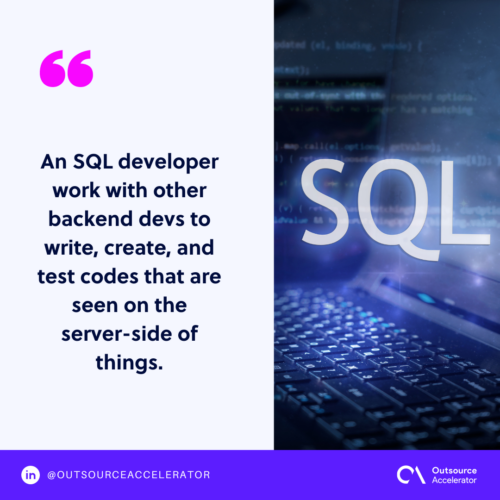SQL developer
Definition
What is an SQL developer?
An SQL developer is a sub-branch of backend developers who develop SQL databases. They work with other backend devs to write, create, and test codes that are seen on the server-side of things.
SQL development pertains to the process of designing tables, writing views and functions, storing procedures, and more.
SQL developers often work with project managers and clients, even though the essence of their work revolves around the “backend” side of the project. Clients and customers have control of their timelines and the budget.
Further, developers have to provide extensive documentation to whatever changes they made or will make to the existing project. These logs will help them when a patch or another change will be made in the future.
Backend projects may be built from scratch or in collaboration with another team while being developed by others for performance reasons.
If they plan for future changes or add new features during the schedule, then database projects will be completed within weeks instead of coding which may take months to build.

SQL developer salary
While SQL development projects can be a bit too repetitive in nature—it’s no doubt that they are one of the most well-paid individuals in the software development team.
This just shows just how important they are when it comes to the software development life cycle (SDLC). Without them, the backend of each and every project would essentially be lifeless.
SQL developer salary: US vs PH
| Annual SQL developer salary | |||
| Junior developer | Mid developer | Senior developer | |
| United States | US$96,411 | US$108,500 | US$128,000 |
| Philippines | ₱580,000 (US$11,563.57) | ₱702,000 (US$13,995.91) | ₱900,000 (US$17,943.48) |
By going on the table below, we can compare how much a US-based SQL developer does compared to their Philippine-based counterparts. But do keep in mind that these figures are heavily dependent on state wages, provincial, and municipal rates.
These figures are also independent of bonuses and incentives that companies give their employees.
For instance, a junior SQL developer (1 to 4 years of experience) in the United States can earn up to $96,411 per year while Philippine-based ones only get ₱580,000 (US$11,563.57) during the same period.
Onto the next one: A mid-level developer with around five to seven years of experience earns up to $108,500 in the US. A Philippines-based professional with the same years of experience earns around ₱702,000 (US$13,995.91).
Finally, we get to the senior level devs with at least 8 years of experience in the field—making them the most experienced ones in the team. In the US, they earn $128,000 a year, while their counterparts in the Philippines earn around ₱900,000 (US$17,943.48).
Essential tools for every SQL developer
To thrive in their role, an SQL developer must be proficient in several key tools and practices. The Oracle client is vital for connecting to Oracle databases, while SQL scripts are essential for automating database tasks.
Effective import data tools ensure that data is accurately transferred between systems, and understanding database connections is crucial for maintaining the integrity and performance of the database.
Database administrators often collaborate with SQL developers, particularly when managing SQL Server environments. The ability to work within both Oracle and SQL Server platforms is a valuable skill set that enhances a developer’s versatility.
What vital technologies should an SQL developer master?
Oracle database technologies
For an SQL developer, proficiency in Oracle databases is often a significant advantage.
Oracle SQL Developer is a popular integrated development environment (IDE) that simplifies the development and management of database objects.
This tool provides a modern command line interface, enabling developers to execute SQL statements efficiently.
One of the standout features of Oracle SQL Developer is the SQL Developer Data Modeler. This is a complete data modeling solution that supports logical, physical, relational, and multidimensional data modeling. It allows developers to design and deploy complex database schemas with ease.
Additionally, the SQL history feature keeps track of all executed queries, making it easier to reference past work.
Oracle’s autonomous cloud solutions
In the era of cloud computing, the Oracle Autonomous Cloud Database offers unparalleled advantages. This self-driving database is designed to automate routine database tasks such as patching, backups, and tuning, freeing up developers to focus on more strategic work.
Integrating with Oracle REST Data Services allows developers to easily create RESTful web services for Oracle databases, enhancing the accessibility and utility of the data.
Azure SQL database
While Oracle remains a dominant player, Microsoft’s Azure SQL Database is another powerful tool for SQL developers.
Azure’s cloud-based solution provides a fully managed relational database service that supports the deployment, scaling, and management of databases in the cloud.
Developers can also leverage Visual Studio Code for a streamlined development experience, thanks to its robust SQL extension that supports SQL scripts and database connections.







 Independent
Independent




